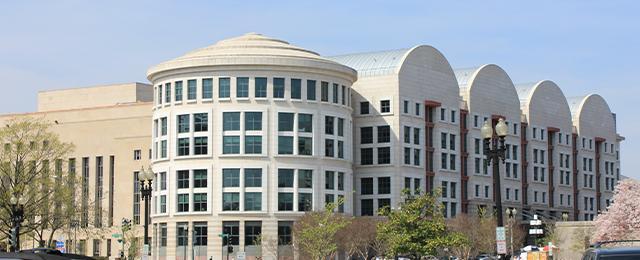A U.S. Court of Appeals upheld a federal program allowing international students to live and work in the United States for up to three years after graduating from an undergraduate university program, a position for which Georgetown University expressed support in an amicus brief.
On Oct. 4, the U.S. Court of Appeals for the District of Columbia Circuit affirmed the Department of Homeland Security’s (DHS) 2016 Optional Practical Training (OPT) program, a one-year employment authorization for F-1 visa students with the option of a two-year extension for students working in STEM fields.

The OPT program was originally challenged in 2016 when the Washington Alliance of Technology Workers (WashTech), a union representing workers in the STEM labor market, filed a suit against the DHS. The U.S. District Court for the District of Columbia in January 2021 ruled in favor of the OPT program as well as the two-year STEM extension. After an appeal, WashTech argued the case to the U.S. Court of Appeals for the District of Columbia last November. On Oct. 4, the Court of Appeals reaffirmed the validity of the OPT program in a two to one decision.
Groups including the Presidents’ Alliance on Higher Education and Immigration, an alliance of leaders in American higher education that focuses on raising awareness about immigration policies and practices on higher education, and NAFSA: Association of International Educators, a non-profit organization centered around international education, organized 118 public and private colleges and universities in an amicus curiae brief. Amici curiae briefs present relevant facts and arguments from the perspective of groups with strong interests in the court decision. Georgetown contributed to the amicus curiae brief in support of the OPT program.
The brief argues that the OPT is a government program that not only provides benefits for international students but also allows American higher education institutions to attract the most outstanding students from around the world.
“If WashTech has its way, OPT will cease to exist,” the brief reads. “And if it ends, so too will the myriad benefits of OPT to international students, American colleges and universities, and the national economy. If OPT is eliminated, international students will have fewer opportunities to continue their education beyond the walls of the classroom — something that research shows is often required to master complex fields such as those in the STEM area.”
Mark Karthik (SFS ’26), who is from Hong Kong, said he looks forward to taking full advantage of the work opportunities the decision has provided.
“I think it’s a great move to uphold the program, and I’m glad to see Georgetown’s support for international students,” Karthik told The Hoya. “I plan on taking advantage of the OPT program and the extension because I intend to major in econ. I look forward to gaining work experience and learning from this opportunity.”
A university spokesperson said being able to work in the U.S. after graduation is a crucial part of the university experience.
“Georgetown applauds the D.C. Circuit Court of Appeals ruling,” the spokesperson wrote to The Hoya. “Applying the knowledge gained through academic study in a practical setting is an indispensable part of the higher education experience.”
Victor Cha, vice dean for faculty and graduate affairs in the department of government and the School of Foreign Service (SFS), said it is important for students to gain work experience in the U.S.
“Even our best students can only learn so much from the classroom; they must then test and further these lessons in the real world,” Cha wrote in a statement in the brief. “The opportunity to undertake internships, employment, or research is critical to their development as future leaders in a more globalized world community for generations forward.”
Madeline Lee (SFS ’25), who is from South Korea, said that while she sees the program as a success, she hopes in the future it will extend to students that major in fields other than STEM.
Full disclosure: Lee is a Social Media Assistant at The Hoya.
“I think it’s good because the process of getting a work visa can be difficult, and it provides more flexibility for international students after graduation,” Lee told The Hoya. “It would be better if non-STEM students also got to work three years.”




















